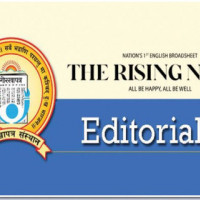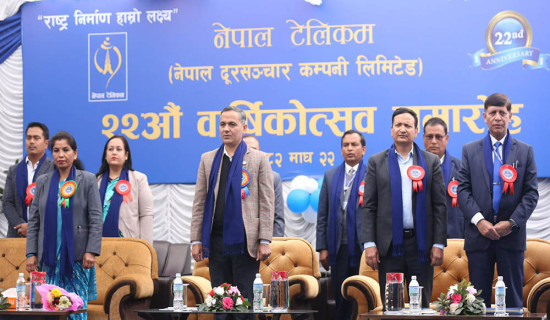- Thursday, 5 February 2026
SPP Debate Is Over
Taking the country’s sensitive geopolitical location into account, Nepal government has formally decided to withdraw from the US State Partnership Programme (SPP). A recent cabinet meeting made a decision to inform the United States, through Nepali Army (NA), that it would pull out of the SPP. The NA had requested the US Embassy in Nepal in 2015 and 2017 for its participation in the SPP. In 2019, the US had accepted Nepal’s request to join the SPP but when the accord was disclosed recently, it generated strong reactions from the political parties, lawmakers, media and civil society members. However, the government’s decision has put all those controversies to a rest. It has effectively allayed the concerns whether the government will ink a deal on the SPP during Prime Minister Sher Bahadur Deuba’s upcoming visit to the US. PM Deuba has time and again said that he would not sign any accord that undermines the country’s sovereignty and national interest.
Several institutions, including political parties, the government and army were dragged into controversy after some online media leaked a document purporting to be an accord on SPP although the US embassy here termed it a fake document. The embassy went on to say that Nepal had already been a part of SPP in 2019. Confusion and distrust prevailed as the SPP dispute grew. The NA had claimed it wrote to the embassy, seeking support in the disaster in the wake of the 2015 earthquake, not to be the part of military alliance. The main opposition CPN-UML criticised the NA for corresponding with the foreign government by sidestepping the civilian wings of the government. However, the army leadership has expressed commitment that it would not participate in any military alliance.
In order to avoid this sort of disagreement in the future, the present government has decided to channel all correspondences to foreign diplomatic missions only from the Ministry of Foreign Affairs, according to a news report of this daily. By dissociating itself from the SPP, Nepal has once again demonstrated that the country’s foreign policy is guided by nonalignment philosophy that forbids the country from getting involved in any military alliance with the superpowers. Nepal is aware of its core security interest and that of its neighbours so it is disinclined to participate in any form of military engagement with external forces. Nepal has been able to maintain its dignity and avoid unnecessary geopolitical pitfalls through the adoption of independent and neutral foreign policy based on the principle of Panchasheel.
The dispute on the SPP flared up four months after Nepal’s parliament endorsed the US Millennium Challenge Corporation (MCC) Nepal Compact. In accepting the MCC grant, Nepal had made it clear that it does accept development fund with no strings attached but it never becomes the part of any military pact. Considering the public sentiments in Nepal, the US embassy also demonstrated a prudent diplomacy. Issuing a statement, it said that Nepal could stop its participation in the SPP if it wished so. The US reconciliatory position also helped Nepali side to forge consensus on rejecting the SPP. The political parties should develop common stance and viewpoint on the nation’s foreign policy and conduct with other nations. Their consensus is the key to executing the balanced foreign policy, thereby averting unnecessary disputes and mustering international support for the country’s overall development.

















